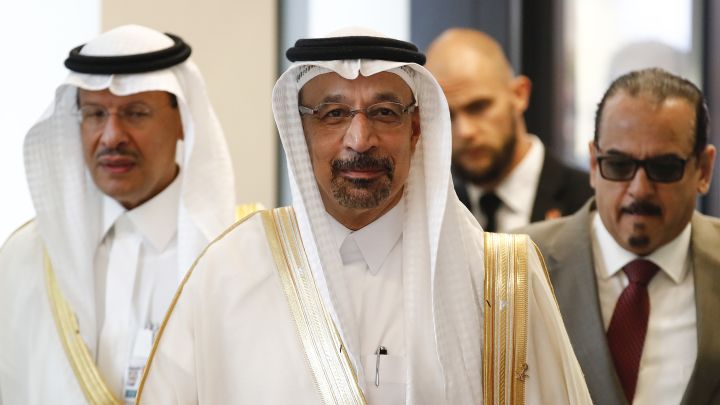Saudi Arabia’s energy minister said Sunday he’s positive OPEC and partnered nations will meet their production cut commitments to balance oil markets in 2019, despite what he described as a slower than anticipated pace by some.
“We’ve already done it, we’ve done enough,” Saudi Energy Minister Khalid al-Falih told CNBC on Sunday in Abu Dhabi, when asked what OPEC’s largest producer would do to balance markets this year. “Not only the kingdom but other countries, we’ve heard from the Emirates, I’ve talked repeatedly to my colleagues in Iraq, they’ve already taken action, ”he told CNBC’s Hadley Gamble.
He then mentioned the performance of the largest non-OPEC producer that’s partnered with the cartel on cuts: “Russia has started, slower than I’d like, but they’ve started, and I am sure as they did as in 2017 they’ll catch up and be a positive contributor to re-balancing the market. ”
OPEC members, along with several other countries, in December agreed on output cuts totaling 1.2 million barrels per day in order to stem a sinking market and support their own export-dependent economies. “OPEC plus” refers to the group’s cooperation with the non-OPEC producers like Russia and other former Soviet states, as well as Mexico. Russia was more reluctant to cut its output, as its growth is heavily dependent on robust crude exports.
Russia has initially let the Saudis shoulder the bulk of output cuts. The top OPEC ally, which in late 2016 began a cooperation agreement with Riyadh to stabilize oil prices, has often said that $60 per barrel is enough to meet its economic needs. Moscow in December said it would cut production by 50,000 to 60,000 barrels a day in January, while Saudi pledged a cut of 900,000 barrels.
The last quarter of 2018 was defined by dramatic volatility in global oil markets, during which concerns over global oversupply and slowing demand sent prices from October highs of more than $86 per barrel plunging to just above $50. The commodity has staged a recovery into January, with the international Brent crude variety currently hovering slightly above $60.
In 2017, when OPEC and its allies first agreed to cut production, Russia similarly took baby steps compared to its Saudi counterpart due to the challenge of making changes to oil fields in the freezing Siberian winter.Willing to work with ‘all interested producers’
Earlier Sunday, al-Falih told CNBC that his country is willing to work with all parties to balance the crude market in 2019, and that could include coordinating with U.S. President Donald Trump.
Asked if he would work with Trump, al-Falih replied, “We will work with all interested producers who want to bring stability to the market … OPEC plus and anybody else who would like to do it with us.”
The American president has been vocally critical of the 14-member oil cartel, calling for increased production to keep prices low and tweeting more than once that the group was “ripping us off.”
The energy minister also confirmed the timeline for the long-delayed public listing of Aramco, Saudi Arabia’s state energy giant. In response to questions over whether the listing was still planned for 2021, al-Falih replied, “Yes, yes that’s the correct target.”

